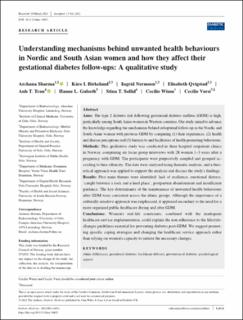| dc.contributor.author | Sharma, Archana | |
| dc.contributor.author | Birkeland, Kåre I. | |
| dc.contributor.author | Nermoen, Ingrid | |
| dc.contributor.author | Qvigstad, Elisabeth | |
| dc.contributor.author | Tran, Anh T. | |
| dc.contributor.author | Gulseth, Hanne L. | |
| dc.contributor.author | Sollid, Stina T. | |
| dc.contributor.author | Wium, Cecilie | |
| dc.contributor.author | Varsi, Cecilie | |
| dc.date.accessioned | 2021-09-02T12:39:37Z | |
| dc.date.available | 2021-09-02T12:39:37Z | |
| dc.date.created | 2021-08-13T21:16:36Z | |
| dc.date.issued | 2021 | |
| dc.identifier.citation | Sharma, A., Birkeland, K. I., Nermoen, I., Qvigstad, E., Tran, A. T., Gulseth, H. L., Sollid, S. T., Wium, C., & Varsi, C. Understanding mechanisms behind unwanted health behaviours in Nordic and South Asian women and how they affect their gestational diabetes follow-ups: A qualitative study. Diabetic Medicine, Artikkel e14651. | en_US |
| dc.identifier.issn | 0742-3071 | |
| dc.identifier.uri | https://hdl.handle.net/11250/2772599 | |
| dc.description.abstract | Aims: The type 2 diabetes risk following gestational diabetes mellitus (GDM) is high, particularly among South Asian women in Western countries. Our study aimed to advance the knowledge regarding the mechanisms behind suboptimal follow-up in the Nordic and South Asian women with previous GDM by comparing (1) their experiences, (2) health and disease perceptions and (3) barriers to and facilitators of health-promoting behaviours.
Methods: This qualitative study was conducted in three hospital outpatient clinics in Norway, comprising six focus group interviews with 28 women 1–3 years after a pregnancy with GDM. The participants were purposively sampled and grouped according to their ethnicity. The data were analysed using thematic analysis, and a theoretical approach was applied to support the analysis and discuss the study's findings.
Results: Five main themes were identified: lack of resilience, emotional distress, ‘caught between a rock and a hard place’, postpartum abandonment and insufficient guidance. The key determinants of the maintenance of unwanted health behaviours after GDM were consistent across the ethnic groups. Although the importance of a culturally sensitive approach was emphasised, it appeared secondary to the need for a more organised public healthcare during and after GDM.
Conclusions: Women's real-life constraints, combined with the inadequate healthcare-service implementation, could explain the non-adherence to the lifestyle-changes guidelines essential for preventing diabetes post-GDM. We suggest promoting specific coping strategies and changing the healthcare service approach rather than relying on women's capacity to initiate the necessary changes. | en_US |
| dc.language.iso | eng | en_US |
| dc.rights | An error occurred on the license name. | * |
| dc.title | Understanding mechanisms behind unwanted health behaviours in Nordic and South Asian women and how they affect their gestational diabetes follow-ups: A qualitative study | en_US |
| dc.type | Peer reviewed | en_US |
| dc.type | Journal article | en_US |
| dc.description.version | publishedVersion | en_US |
| dc.rights.holder | © 2021 The Authors. | en_US |
| dc.source.journal | Diabetic Medicine | en_US |
| dc.identifier.doi | https://doi.org/10.1111/dme.14651 | |
| dc.identifier.cristin | 1925956 | |
| dc.source.articlenumber | e14651 | en_US |
| cristin.ispublished | true | |
| cristin.fulltext | original | |
| cristin.qualitycode | 1 | |
